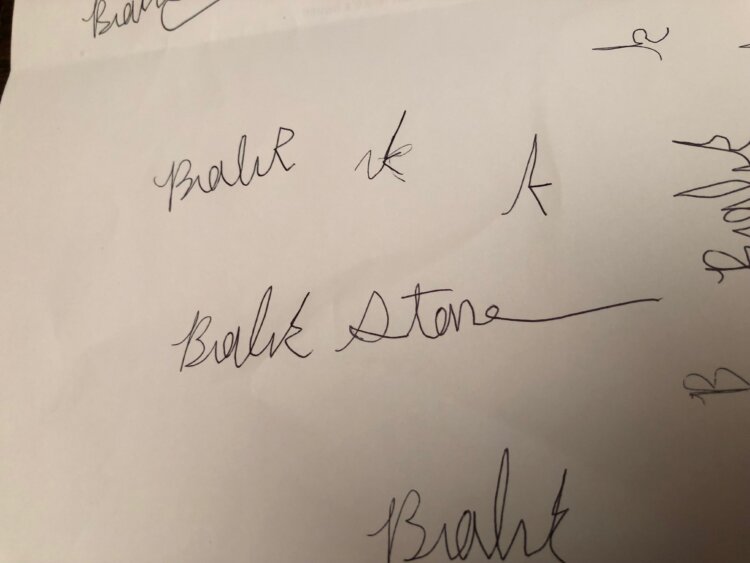
I had no intention of changing my last name after getting married. It made absolutely zero sense to me why I should change my name to become part of my husband’s name. The origins of this practice are part of an antiquated notion of women literally becoming part of a man’s household when she married him and moved in with him and his family. A woman’s family had to pay for her to enter his household and she was responsible for bringing with her a collection of clothing and bedding to provide for her new life in this man’s home.
That didn’t sound like something I wanted to hearken back to. Am I thinking too much? Of course I am.
As the wedding date neared, I felt a strange and foreign pull: I started to see the value of being “one” with the same last name. I was so excited to get married, which surprised me since I was never a “I can’t wait to get married” kind of woman. But I resisted the temptation to change my name and was proud of not changing my name, especially because I had already published an abstract in my new career as a Neuroscience student and had co-authored a chapter in a book (based on my research with patients who had had their corpus callosums sectioned). I kept my last name since it was tied to my professional career and my identity as an independent woman. I was me–Mayim Bialik–and marriage would not change that.
Then I got pregnant. And my now-ex and I started talking about our unborn child’s last name. What are we to do!?
Options:
- Baby gets his name
- Baby gets my name
- Baby gets a hyphenated name
- Baby gets a new name which is a combination of our names and we all take new names
Then we thought, what if we have a second baby? Do we give one my last name and one his? Then they would have separate last names and possible separate identities and that might damn them to a life of feeling separate and competitive and hating each other forever!
Sibling clause established: Sibs must have same last names. This much we knew.
Back to unborn Baby #1.
My thoughts:
- Why would they get his name? What about them was “his”? That’s convention for “feminist” types like me who keep their names, but why? It logically makes absolutely no sense to me.
- Why would my name have any more weight than his? If it was a girl, I thought maybe we would be instilling her with my independence and convictions, but see sibling clause above. True feminism for me and my ex meant equality. Not superiority.
- Really? What do hyphenated kids actually do? Well, I knew hyphenated twins. Daniel and Jeremy Lehrer-Graiwer. Everyone called them the Lehrer-Graiwers. I thought it was a mouthful, but I also really dug that their mom got her name in there. They are now successful cartoonists and artists and they go by Lehrer boys. Hmmm. Mischa Goldberg-Lockton, the first boy I ever had feelings for (in middle school) became known as Mischa Goldberg. I may be wrong, but I think the moms’ names were last. Hmmm. Also, what would our kids do if they met another hyphenated human? Honestly, this kind of last name growth did not seem sustainable.
- I know some friends who did this. The kids got a separate last name from each of them. But then the family had no “last name cohesion” if there is such a thing. And everyone changing names takes away my reason for keeping mine in the first place. My name means something to me and my family, as does my ex’s. This is hard.
In the end, we chose to give our sons two last names. I wanted mine first (out of fear that, like Mischa and Daniel and Jeremy’s moms, my name would be lost) and my ex actually preferred his name last. Our boys have middle names and yes, they have two unhyphenated last names. It’s a lot, but I really didn’t know what else to do.
Some might say I should just get over myself and let them have their dad’s name, but it’s those kinds of subtle things that many of us don’t want to let go. Because to me, it makes no sense and it’s as antiquated as me taking a man’s name.
What happens when you don’t hyphenate is that children get alphabetized by the last isolated word in their name. So my boys are typically listed on soccer and school rosters and such under Stone, and that’s okay with me. Their dad and I sometimes have to correct teachers or typesetting for plays so that they are listed with both last names. Is it silly? Maybe. Do my sons understand the value of both of our names? I think so.
And when they meet the person they may someday marry, they get to figure it out. My name may end in a generation as it were. Jewish custom doesn’t even have last names. You are the child of your parents with first and middle names only. Last names were used in the past few hundred years for Jews of Eastern European descent.
When my sons are called to the Torah, their last names are irrelevant. They are the men they were named for as the children of the man and woman who named them. Makes sense to me.




 Read More From Mayim
Read More From Mayim
Grok Nation Comment Policy
We welcome thoughtful, grokky comments—keep your negativity and spam to yourself. Please read our Comment Policy before commenting.